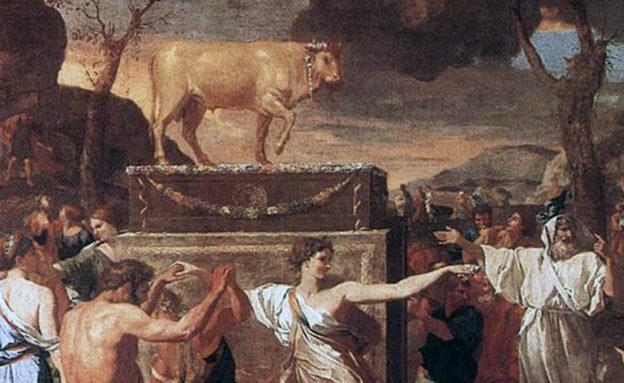Earlier this week the children rose from bed before I did and went down to the lounge. As I did not appear and the pangs of hunger were striking, the boys enterprisingly took a pair of scissors to a packet of chocolate biscuits and helped themselves, despite our clear teaching that biscuits are a gift given by adults, not presumed by hungry boys! I heard the activity and intervened, but not before two biscuits were partly eaten.
I tell this not to embarrass my kids but to illustrate a point. In our lives, when it seems like things are not going as we would like, we often take matters into our own hands, usually sinfully. The Golden Calf incident demonstrates exactly this. Left alone for nearly a month, God’s People grew frustrated and restless at Moses’ absence, and created a deity they could worship. The result was sinful idolatry.
From Exodus 24:18 to 31:18, forty days and nights have passed. While Moses has remained busy communing with God and learning of the necessary plans for building God’s dwelling place with his people, the Israelites have been waiting at the foot of Mount Sinai, waiting. And waiting.
With Moses, God’s rightful appointed leader, gone there is a vacuum of leadership in the camp. Waiting for things to happen, getting sick of the view and the sand, the people became restless. Yet still, “the people saw that Moses delayed to come down from the mountain” (v.1).
Reflecting their sinful hearts, the people grew impatient with a lack of action by God. He had brought them out of Egypt, but where were the promised blessings?
Action was needed, so “the people gathered themselves together to Aaron and said to him, ‘Up, make us gods who shall go before us. As for this Moses, the man who brought us up out of the land of Egypt, we do not know what has become of him.’” (v.1). The picture painted here is one of an impatient, restless crowd confronting Aaron (Moses’ second-in-command) and presenting him with a demand.
Since the God who had rescued them was not working to their timeframe, they ask Aaron to make them an idol. Impatience turns to distrust, disobedience, and idolatry. Even the role of God and his instrument, Moses, is downplayed in their hearts and speech as they casually turn away from God to idols.
Instead, the pure worship of God of which they have already received basic instructions (to be fleshed out later when Moses descended back to them) is distorted and corrupted.
Rather than the only true God who is spirit and has no body like us, the Israelites have Aaron create a golden bull calf (vv.2-4), made from their jewelry. Others would soon follow, given time: the Israelites asked for multiple gods, not just one.
Instead of the only true and all powerful God, the people wanted multiple, ultimately impotent gods to worship, made from their own things. Gods that could not demand anything of them other than what they were willing to give.
And this is exactly what we see happen next. Aaron’s calf-making complete, he declares “These are your gods, O Israel, who brought you up out of the land of Egypt!”, makes an altar, and declares a feast the next day (vv.4-5). Whether intended as a face saving gesture or just plain old syncretism, Aaron declares that the golden calf is actually God himself! (v.5).
The next day, the people eagerly gather to complete their sin. They offer corrupt worship. Offerings to an idol, a feast in front of the idol, and then to cap it off “rose up to play” (v.6). Except the play was not a game of cricket, but the immoral worship of the pagan nations – debauchery and immorality (especially the sexual kind).
Does any of this sound familiar? Perhaps not the specific circumstances with golden calves, but the pattern of sin in their lives. Frustration and impatience at progress towards something good (or perceived as good). Taking matters into our own hands. Then distrust of God to deliver, disobedience of his commands, and corruption of the good things God gives into sin.
Sin is impatience, disobedience, distrust, and corruption of the good. And we all do it. We might laugh at the absurdity of a people who literally saw God descend on Mount Sinai in fire and majesty and awe, then made a golden calf. But are we really any different, when we have seen God revealed to us through his Word, through Christ preached, and by the Holy Spirit working in our lives?
Lord save us from our unbelief and sin!
Let us give thanks that while Israel failed their forty days of waiting, and we fail in our times too, Jesus did not fail. Jesus’ forty days in the wilderness did not end in impatience, disobedience, and idolatry, but in reliance upon God (Matthew 4:1-11). In all things, Christ was obedient unto death on the Cross for our sins (Philippians 2:4-11).
So our sins could be forgiven.


